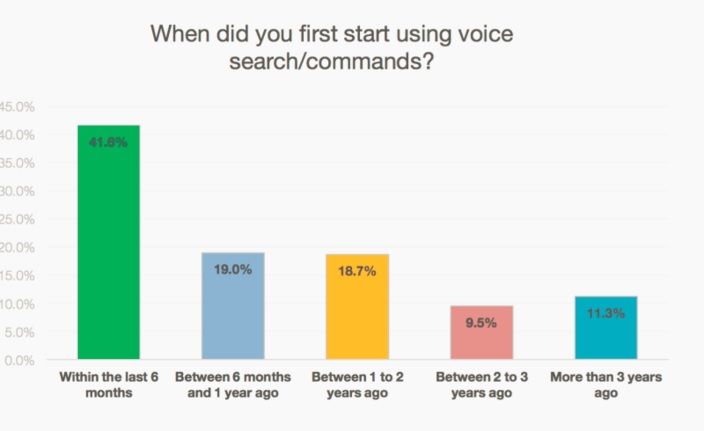Google’s I/O developer conference brought several huge announcements about Google’s future direction and projects, including two new technologies which demonstrate just how important voice search and natural language processing are to the company’s future development.
The first, Google Assistant, is a voice-activated digital assistant which builds on “all [Google’s] years of investment in deeply understanding users’ questions”, as Google’s blog declared. It takes Google’s voice search and natural language capabilities to the next level, while also allowing users to carry out everyday tasks like booking cinema tickets or restaurant reservations.
The second is Google Home, Google’s long-awaited smart home hub to rival the Amazon Echo, which comes with Assistant built in. Google Home – which will be “unmatched in far-field voice recognition”, according to VP of Product Management Mario Quieroz – will give users access to Google’s powerful search capabilities in answering their questions as well as linking together smart devices all over their home.
It’s no surprise that Google is focusing heavily on voice search and natural language going forward when you consider that in 2015 alone, voice search rose from “statistical zero” to make up 10% of all searches globally, according to Timothy Tuttle of the voice interface specialist MindMeld. That’s an estimated 50 billion searches per month.
Indeed, Google CEO Sundar Pichai revealed in his keynote speech at I/O that 1 in every 5 searches made with the Google Android app in the US is a voice query. Bing produced a similar statistic earlier this month when it announced that a quarter of all searches on the Windows 10 taskbar using Bing are voice searches. And statistics like these are only like to increase further as search engines, apps and developers respond to this trend.
Digital assistants: The agents of voice search
Siri. Cortana. Google Now. Alexa. Google Assistant. These are only the names of the most well-known digital assistants from the major technology companies; a search for “digital assistant” on the iOS or Android app store shows just how many different varieties of these voice-controlled AIs there are.
Digital assistants are overwhelmingly the medium through which we interact with voice search and carry out natural language queries, so it makes sense that they, too, are on the rise as companies compete for the biggest share of this rapidly expanding market.
The figures show just how recent much of this uptake of voice search is. Late last year, MindMeld published a study of smartphone users in the U.S. and their use of voice search and voice commands. It found that 60% of smartphone users who used voice search had begun using it within the past year, with 41% of survey respondents having only begun to use voice search in the past 6 months.
 Image: MindMeld
Image: MindMeld
With that said, digital assistants are not just confined to smartphones any more, increasingly integrated into devices like smart home hubs and game consoles. And the more that we speak to and interact with assistants, pushing the limits of what they’re capable of, the more sophisticated they become.
The newest generation of digital assistants, including Google Assistant and Viv, a new AI from the creators of Siri, are capable of interpreting and responding to long, multi-part and highly specific queries. For example, during a public demonstration in New York, Viv showed off its ability to accurately respond to queries like, “Was it raining in Seattle three Thursdays ago?” and “Will it be warmer than 70 degrees near the Golden Gate Bridge after 5PM the day after tomorrow?”
At the demonstration of Google Assistant at Google’s I/O conference, Sundar Pichai made much of the fact that you can pose follow-up queries to Assistant without needing to restate context. That is, you can ask a question like, “Who directed the Revenant?” and then follow up by saying, “Show me his awards,” and Assistant will know that you are still referring to director Alejandro Iñárritu in the second query. (It’s worth noting, though, that Bing’s web search has been able to do this for a while).

Continuing the conversation: Google’s Assistant can now handle follow-up questions to a previous query without needing to hear the subject again
How voice queries are changing search
So how is this upswing in voice queries and technology’s increasing ability to respond to them changing the way that users search?
We don’t search with voice the same way that we search with a keyboard. Computer users have evolved a specific set of habits and expectations for web search based on its limitations and capabilities. So we would start off by typing a quite generalised, keyword-based search query like “SEO tips”, see what comes back, and progressively narrow down through trial and error with longer search terms like “SEO tips for m-commerce” or “SEO tips for beginners”.
Or if we were looking to buy a pair of red shoes, we might search for “red shoes” and then navigate to a specific website, browse through their shoes and use the site interface to narrow down by style, size and designer.
Whereas now, with the advanced capabilities of search engines to understand longer, more specialised searches and the advent of voice search making natural language queries more common, we might start off by searching, “Quick SEO tips for complete beginners”, or, “Show me wide-fit ladies’ red shoes for under £50.”
 We search differently with a keyboard to the way we search with voice
We search differently with a keyboard to the way we search with voice
The increasing rise of voice search brings with it a wealth of new data on user intent, habits and preferences. From the first query about SEO, a site owner can see that the searcher is not just a novice but a complete novice, and is not looking to spend a lot of time researching in-depth SEO guides; they want a list that’s easy to digest and quick to implement.
From the second query, a shop owner can tell exactly what type of shoes the consumer is looking for, down to the fit and colour. The price range indicates a budget and an intent to buy.
When mobile users are conducting voice search with location enabled, site owners and business owners can also gain valuable location data. Often, the voice query will contain the important phrase “near me”, which shows that the searcher is looking for local businesses. Mobile voice searches are three times more likely to be local than text, so optimising for local search and mobile will also help you to rank for many voice searches.
With the growth of voice search, we can expect to see more and more long-tail search keywords and natural language queries, which give increasing amounts of contextual information and useful data about searcher intent. The addition of voice assistants to smart home hubs like Amazon’s Echo and Google Home (Apple is also reported to be developing its own smart hub with Siri built in) will also give the companies behind them access to untold amounts of data on users’ daily life and habits, purchases, interests and more, opening up new avenues for marketing.
How can you capitalise on voice search?
With all of that in mind, what practical things can website owners do to take advantage of this new search frontier?
Look out for natural language queries in your site analytics
At the moment, there’s no way to tell outright which users are reaching your site through voice search, though Google is rumoured to be developing this feature for Google Analytics. But by looking out for natural language queries in your search traffic reports, you can start to get a feel for what users might be asking to find your site, learn from it and use it to inform your SEO strategy.
Think about how people are likely to phrase queries aloud
We need to start moving our approach from thinking of endless variations on different keywords to thinking about different types of questions and phrases that users might search. Ask yourself which questions might bring a user to your site, and how they will speak them aloud. What are the extra words, the ones that wouldn’t appear in a regular keyword search, and what information do they give you about the user’s intent on your site?
Make sure your site is set up to answer searchers’ questions
Once you’ve considered the types of questions a user might be asking, consider whether your site will satisfy those queries. Rob Kerry, in a presentation on the future of search at Ayima Insights, advised website owners to start integrating Q&A-style content into their sites in order to rank better for natural language searches and better satisfy the needs of users who are asking those questions.
Q&A-style content can also be excellent material for featured snippets, which is another great way to gain visibility on the search results page.
Develop content with a conversational tone
Because natural language queries reflect the way that people speak, they aren’t just longer but more colloquial. So consider if there are ways that you can create and incorporate content with a more conversational tone, to match this.
Use voice search!
One of the best ways to understand voice search, how it works and what kind of results it returns is to use it yourself. Search the questions you think might bring people to your site and see what currently ranks top, to get a sense of what works for others. Are there questions that aren’t being addressed, or answered very well? You can take this into account when creating content that is geared towards voice search.
The article The continuing rise of voice search and how you can adapt to it was first seen from https://searchenginewatch.com


No comments:
Post a Comment